The Democrats
Hillary Clinton
The frontrunner in the Democratic Party,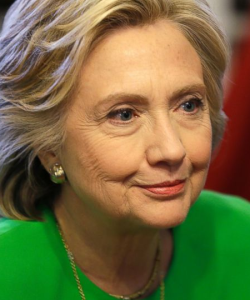 Hillary Clinton lost to Barack Obama in the 2008 election. Since then she has served as Secretary of State under Obama, but is now seeking to succeed her one-time rival for the White House.
Hillary Clinton lost to Barack Obama in the 2008 election. Since then she has served as Secretary of State under Obama, but is now seeking to succeed her one-time rival for the White House.
Clinton has pitched her candidacy on her experience and knowledge of policy issues. She is seen as a moderate liberal and welcomes the idea that she is the natural successor to Obama, who remains popular among Democrats.
Clinton is criticised for being untrustworthy and too close to big money donors on Wall Street. She has an ongoing investigation into her use of a private email server while serving as Secretary of State, and the Republican-held Congress is hoping to smear the former Secretary through the controversy.
Bernie Sanders
A independent Senator from the small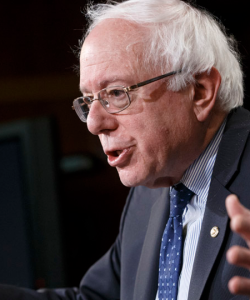 state of Vermont, Bernie Sanders declared last year that he was running for the Democratic nomination.
state of Vermont, Bernie Sanders declared last year that he was running for the Democratic nomination.
Sanders is calling for a political revolution against the status quo where wealth plays a disproportionate role in American democracy. He calls for breaking up the big banks of Wall Street and ending crony capitalist politics.
Sanders initially was perceived to be a message candidate, running in order to pull Hillary to the left on various issues and spread his anti-plutocratic platform. He has done both of these things, and also built up a popularity particularly among young Democrats who feel Hillary is too close to big-money and untrustworthy.
Out
Martin O’Malley
The former Governor of Maryland lasted until the early states voted, but was unable to generate enough support in the early states to support his campaign.
Jim Webb
A former Senator from Virginia, Jim Webb came into the competition with a noted military career, but failed to carve out enough support to propel him into the primaries.
Lincoln Chafee
Chafee, the former Governor of Rhode Island, did little to create noise in the Democratic race, stumbling badly in early debates.
The Republicans
Donald Trump
A former Democrat, Donald Trump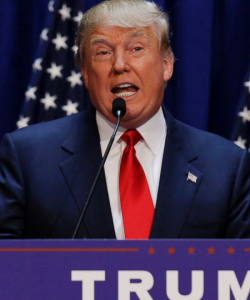 has thrown the entire Republican field into disarray with his undeniable popularity.
has thrown the entire Republican field into disarray with his undeniable popularity.
The controversial billionaire combines relatively liberal views on certain social issues with racial invective. He has called for banning Muslims from America, building a wall across the U.S.-Mexico border, and dubbed Mexican immigrants rapists and murders.
Trump’s appeal is that he is a confident outsider candidate. His candidacy is based on the desire to fundamentally change Washington D.C. and is not held to task by his support for his thin policy proposals.
Many higher ups in the Republican Party hate Trump. They dislike his support for universal healthcare, his economic agenda that calls for tax cuts without substantial trimming in spending, his lack of foreign policy understanding, and his willingness to alienate hispanic voters. Their loss in 2012 taught Republicans that they desperately needed this battleground demographic, but Trump’s rhetoric is driving them further towards the Democrats.
Out
Ted Cruz
A Senator from Texas, Ted Cruz is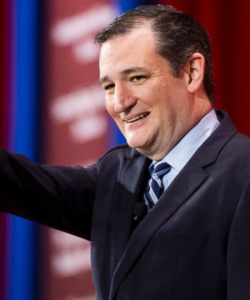 almost as unpopular as Trump within the upper echelons of the Republican Party.
almost as unpopular as Trump within the upper echelons of the Republican Party.
Playing on Tea Party, evangelical voters, Cruz is calling for a massive reduction in the role of the federal government combined with an ultra-hawkish approach to foreign policy. His record in the Senate has been very obstructionist, refusing to compromise on issues. Former Republican nominee John McCain has been among the strongest to disavow Ted Cruz and his ‘wacko bird’ allies in Congress.
Cruz has demonstrated impressive longevity in the Republican race, preaching to a bedrock of the Republican Party and harnessing grass roots anger against Barack Obama. He has, however, fought over this section of the party with Donald Trump.
John Kasich
The Governor of Ohio is the most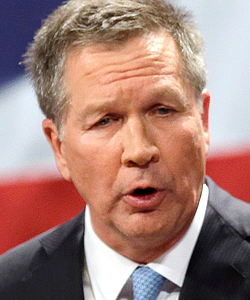 moderate of all remaining candidates. He supported expanding Medicare in his state during the tenure of Barack Obama, and has shown by far the most willingness to work on bipartisan causes if elected.
moderate of all remaining candidates. He supported expanding Medicare in his state during the tenure of Barack Obama, and has shown by far the most willingness to work on bipartisan causes if elected.
Kasich has refused to allow the tone of the debates change his platform, presenting himself as an adult among children. His brand of steady, reasoned leadership has earned him the endorsement of the New York Times, but the governor has found it difficult to translate the broad respect he accrues with votes.
Marco Rubio
The young, hispanic Senator from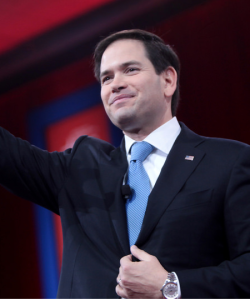 Florida is a rising star of the Republican establishment. His family emigrated from Cuba, and have a powerful story of making the American Dream come true. Republicans hope that he will be able to connect with hispanic Americans in large numbers.
Florida is a rising star of the Republican establishment. His family emigrated from Cuba, and have a powerful story of making the American Dream come true. Republicans hope that he will be able to connect with hispanic Americans in large numbers.
Rubio has distanced himself from parts of his Senate career. In particular, his work on the ‘Gang of Eight’ bill in 2013 that sought to reform immigration has become a central point of criticism in a Republican electorate that shows signs of preferring a wall to legislation.
Though Rubio has attempted to inject optimism into his candidacy, declaring he will usher in a ‘ New American Century’, the state of the Republican field has dragged Rubio further towards the right. Rubio fared poorly in taking on Trump one-on-one, and dropped out after losing his home state of Florida to the real estate mogul.
Ben Carson
A retired neurosurgeon, Carson ran on the ‘outsider’ appeal and was briefly leading the field in polls last year despite a very thin understanding of foreign and domestic policy.
Chris Christie
The Governor of New Jersey was the darling of the Republican Party in 2012, but refused to run. Eschewing his previous appeal as a bipartisan champion, the hawkish Christie burnt out earlier in the year and now has endorsed Donald Trump, earning him scorn and derision among many Republicans.
Jeb Bush
The presumption frontrunner last year, the younger brother of George W. Bush and former Governor of Florida had tremendous advantages in funding and endorsements. However, he was consistently ridiculed by Trump and failed to revive lagging poll numbers.
Rand Paul
A strict libertarian Senator from Kentucky, Paul failed to elicit the same enthusiasm as his father, though made headlines by sparring with Trump in early debates.
Carly Fiorina
The former CEO of Hewlett-Packard also appealed to voters as an ‘outsider’ of Washington D.C. but her paucity of policy knowledge and unconvincing debate performances led her to quit her campaign.
Rick Santorum
An oddity this year, the former Senator of Pennsylvania barely registered on Republican polls despite running a relatively well known campaign in 2012.
Mike Huckabee
The former Governor of Arkansas was a presence in some of the early prime time debate, but flagging polls numbers all but suffocated his campaign before the first state voted.
Scott Walker
Considered a heavyweight last year, the union-busting Governor of Wisconsin dropped out in September due to financial mismanagement and underwhelming poll numbers.